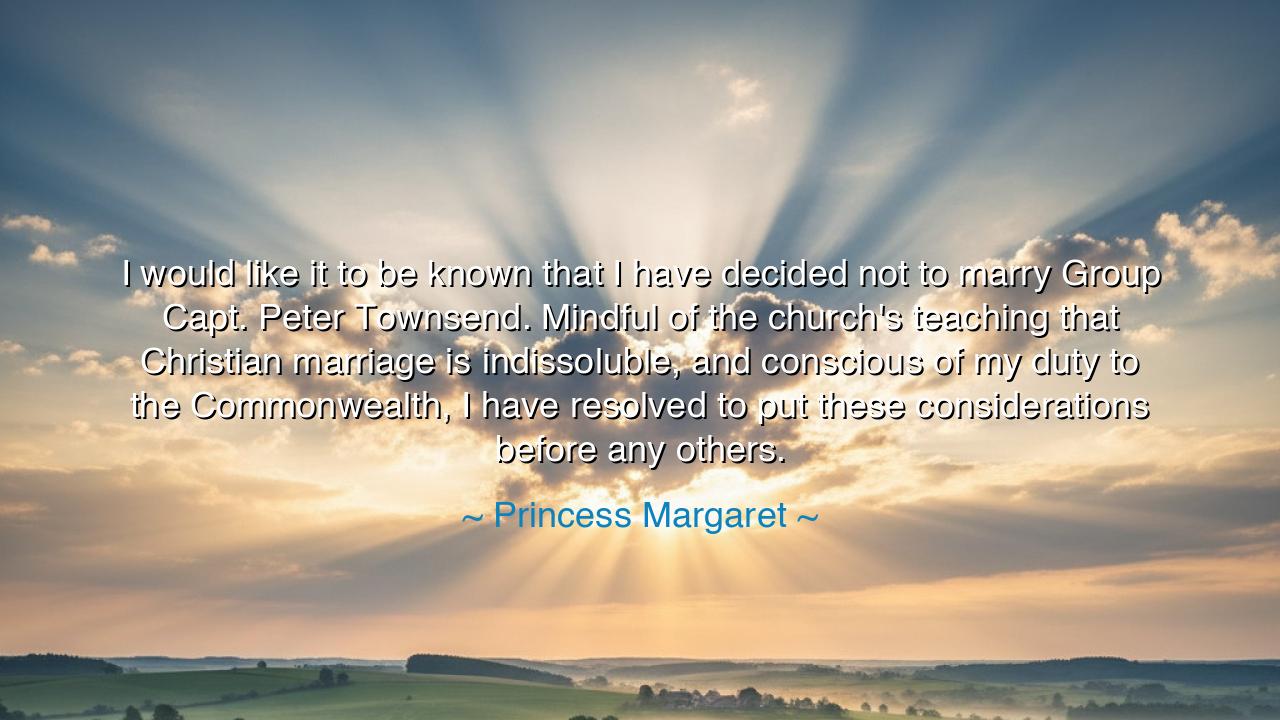
I would like it to be known that I have decided not to marry
I would like it to be known that I have decided not to marry Group Capt. Peter Townsend. Mindful of the church's teaching that Christian marriage is indissoluble, and conscious of my duty to the Commonwealth, I have resolved to put these considerations before any others.






The words of Princess Margaret, “I would like it to be known that I have decided not to marry Group Capt. Peter Townsend. Mindful of the church’s teaching that Christian marriage is indissoluble, and conscious of my duty to the Commonwealth, I have resolved to put these considerations before any others,” stand as a solemn declaration of sacrifice — a quiet yet thunderous moment in the history of love, duty, and faith. In these few sentences, spoken by a woman torn between the call of her heart and the command of her crown, we witness the eternal struggle between personal desire and public duty. Her voice, though calm and regal, carries the sorrow of one who has chosen to love from afar, and the strength of one who has accepted heartbreak as the price of honor.
To understand the weight of her words, one must remember their origin. In the mid-twentieth century, Princess Margaret, sister to Queen Elizabeth II, fell deeply in love with Group Captain Peter Townsend, a decorated war hero — but also a divorced man. The laws of both Church and Crown forbade their union. The Church of England, whose Supreme Governor was her own sister, held marriage to be sacred and indissoluble; divorce, in the eyes of faith and tradition, made remarriage an act of defiance. And the Commonwealth — a living symbol of royal morality and stability — expected its princesses to embody the virtues of restraint and obedience. Thus, Margaret found herself trapped between love’s longing and loyalty’s command. Her announcement was not a retreat, but a sacrifice upon the altar of duty.
In her decision lies a truth known to the ancients: that honor and love often dwell in opposing realms. The heroes of old — from Antigone defying the law for her brother’s burial, to Aeneas abandoning Dido for destiny — were often called to choose between the heart and the greater good. Princess Margaret’s choice echoes theirs. Her tragedy was not born from weakness, but from strength — from the courage to bear sorrow rather than betray the institutions she had been born to uphold. To modern ears, it may sound cruel that love was denied for law, but to her, bound by faith and lineage, duty was not a burden — it was her inheritance.
The words “mindful of the church’s teaching” reveal more than obedience to doctrine; they reveal reverence for something beyond herself. In her acceptance of the Church’s command, Margaret upheld a belief in the sanctity of covenant — that Christian marriage, once made, cannot be broken or remade at will. Whether one agrees or not, her submission to that principle was an act of fidelity to her time and faith. And in saying she was “conscious of her duty to the Commonwealth,” she placed the peace of millions before her own happiness. Such resolve, though born in pain, reflects the old wisdom that true nobility is not in privilege, but in restraint.
Her story finds a reflection in history’s many figures who bore the cost of sacrifice for principle. Consider Catherine of Aragon, the first wife of King Henry VIII, who refused to acknowledge the annulment of her marriage though it meant exile and humiliation. She clung to her vow — not for power, but for conscience. Like her, Princess Margaret stood firm in the face of personal loss, believing that fidelity to divine and civic duty outweighed personal gain. These women, though separated by centuries, share the same tragic grace — a quiet heroism that endures long after passion fades.
Yet, Margaret’s choice also exposes the tension between human longing and institutional rigidity — a conflict as old as civilization itself. For every generation must ask anew: where does duty end, and where does love begin? The ancients taught that balance is the highest virtue — that neither desire nor discipline should wholly rule the heart. And perhaps that is the lesson her life offers us now: that devotion to others, whether to one’s family, faith, or country, must never extinguish the light of compassion for oneself. For while duty sustains the order of the world, love sustains the soul that inhabits it.
Let those who hear her words learn this: every choice of integrity carries a cost, and not all victories are joyous. There will come moments when the world demands that we choose between what we want and what we owe. When that time comes, remember the example of Princess Margaret — who loved deeply, yet yielded nobly. To choose duty over desire is not to abandon love, but to refine it — to turn passion into devotion, and devotion into legacy. Her decision, born of sorrow, became a beacon of dignity, reminding all generations that even in heartbreak, the human spirit can remain sovereign.
Thus, Princess Margaret’s words echo through time not as the lament of a woman defeated by convention, but as the testament of one who understood that sacrifice, too, can be a form of love. In choosing duty, she preserved not only her honor, but the sanctity of her faith and her sister’s reign. And so, her story becomes a lesson for all ages: that true strength lies not in the pursuit of happiness at all costs, but in the grace to give it up for something greater. In that act of renunciation, her heart broke — but her spirit endured, noble, eternal, and unbowed.






AAdministratorAdministrator
Welcome, honored guests. Please leave a comment, we will respond soon